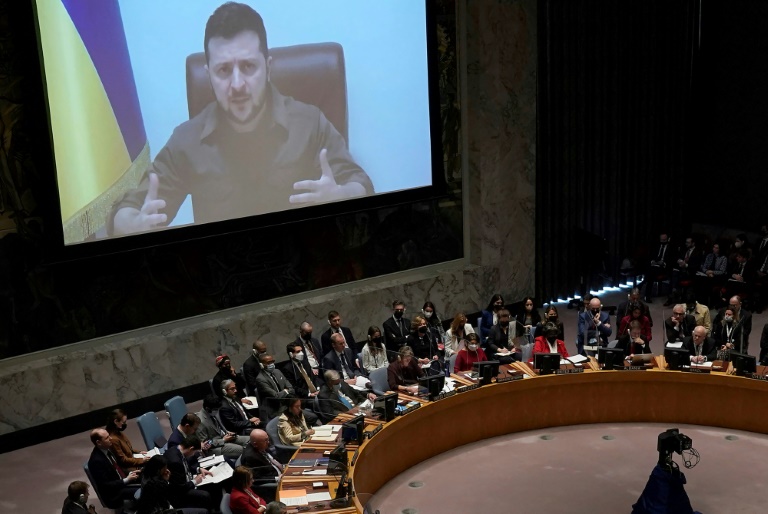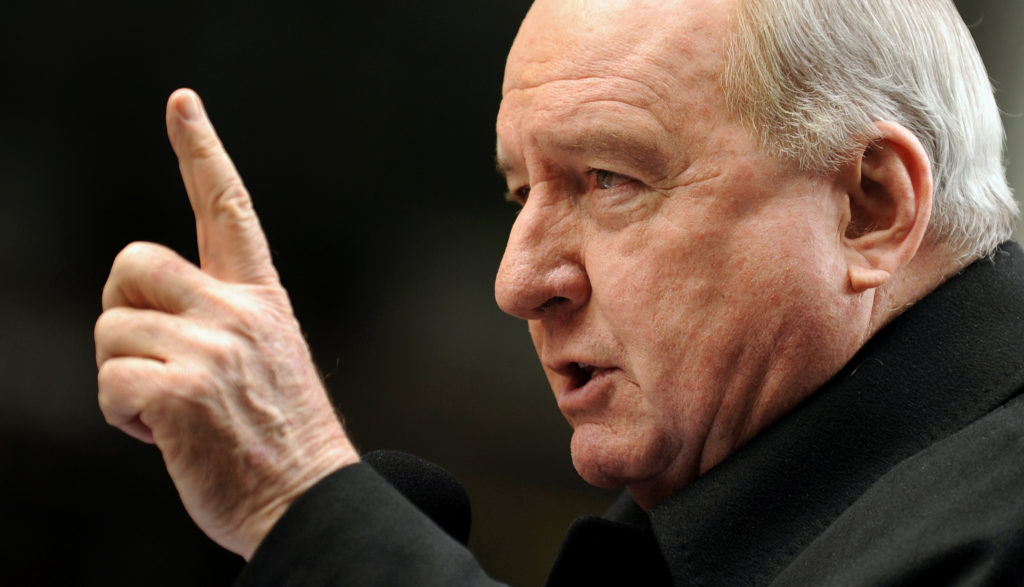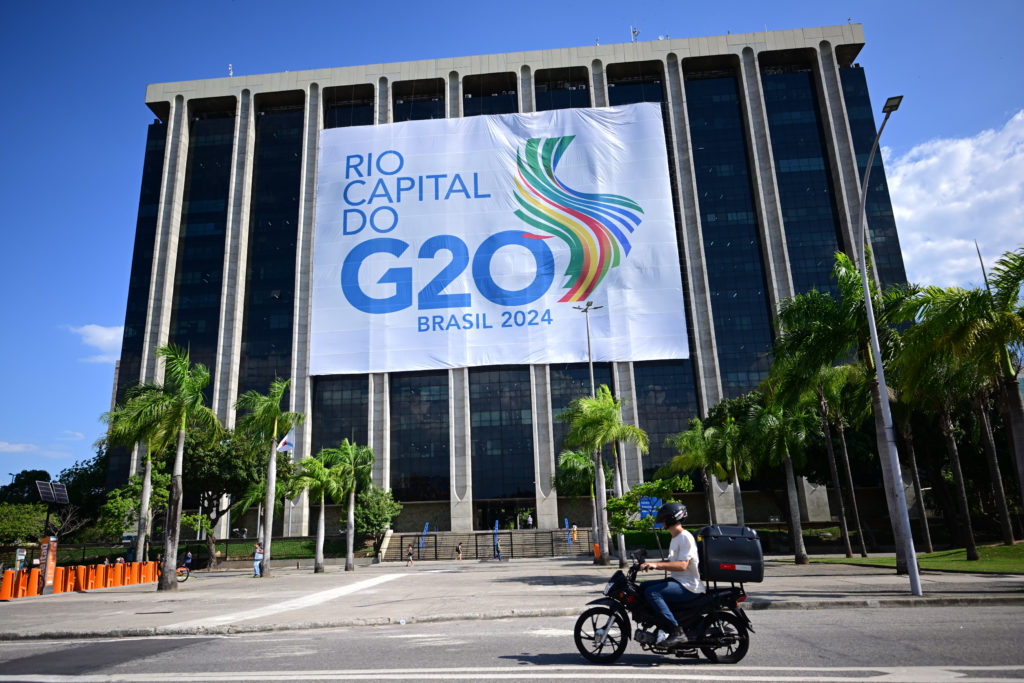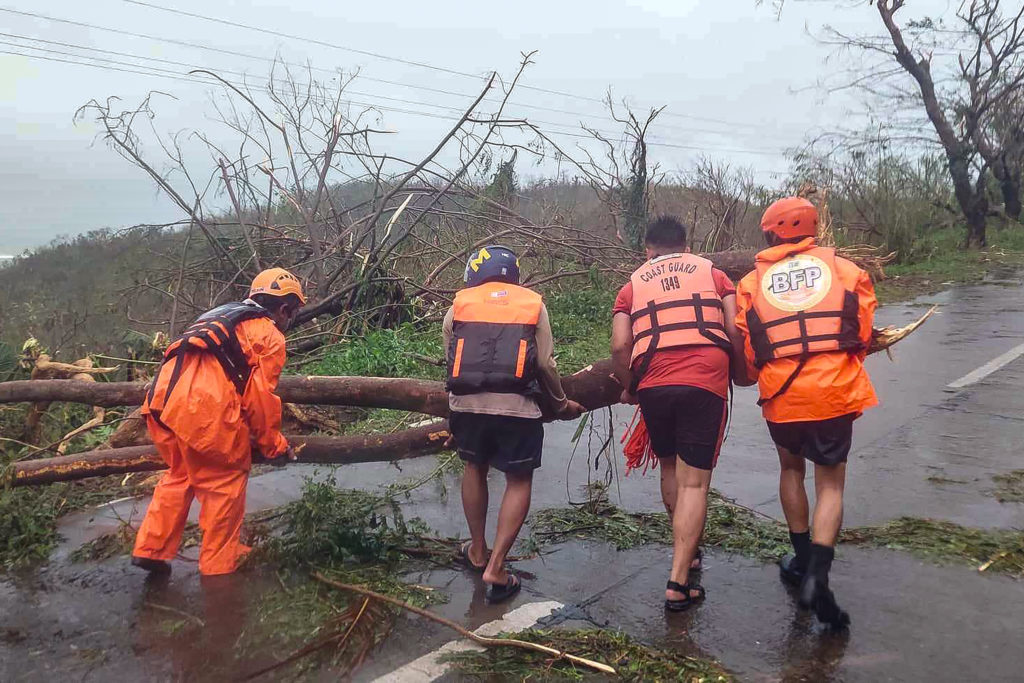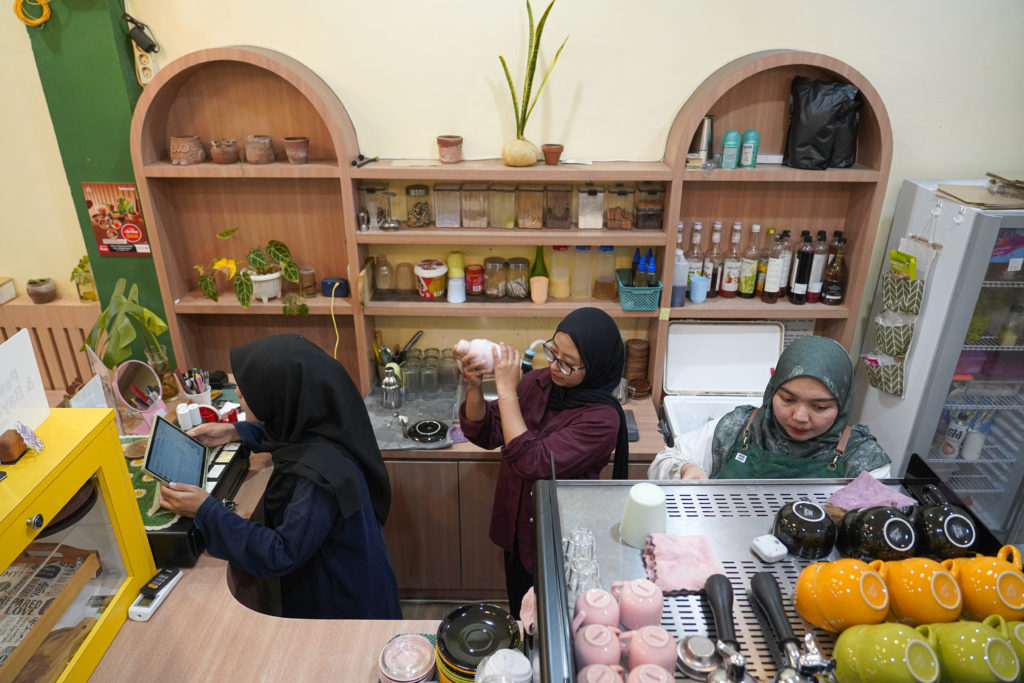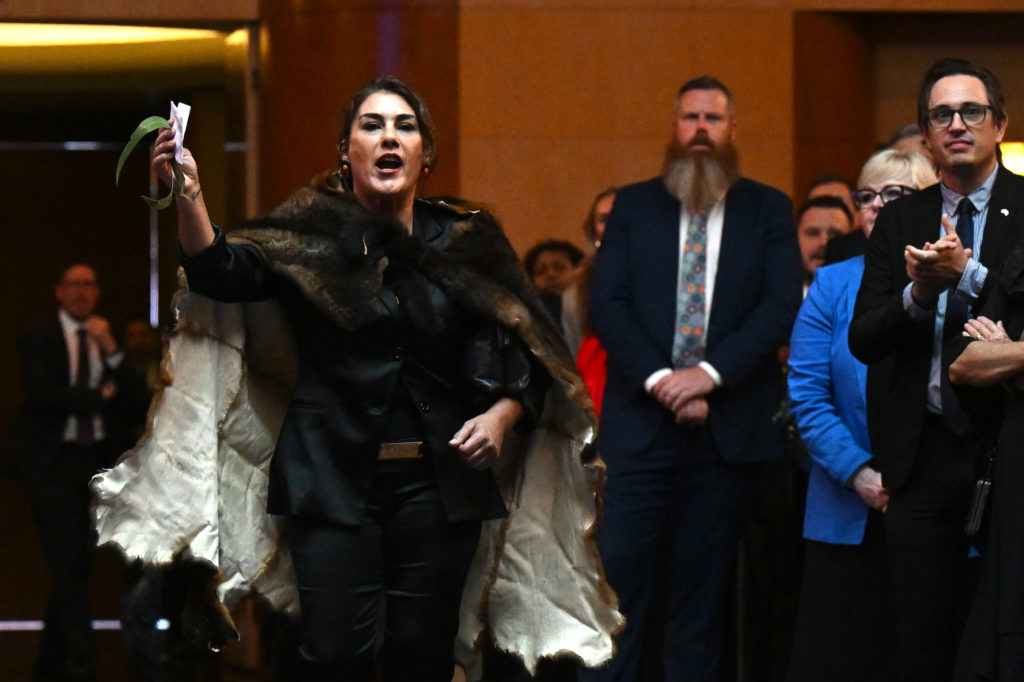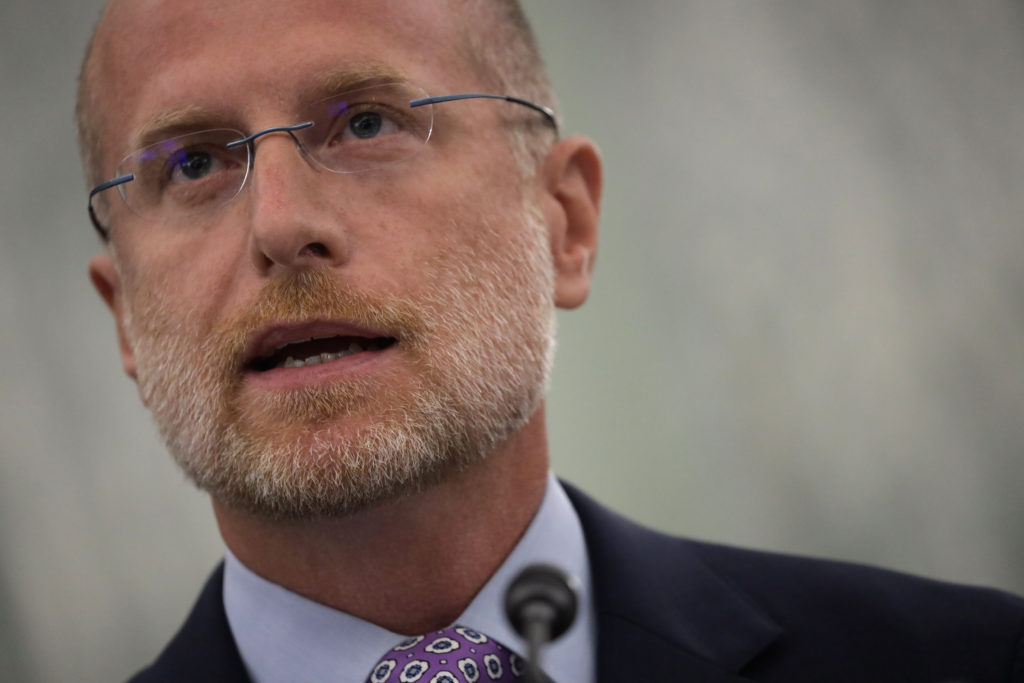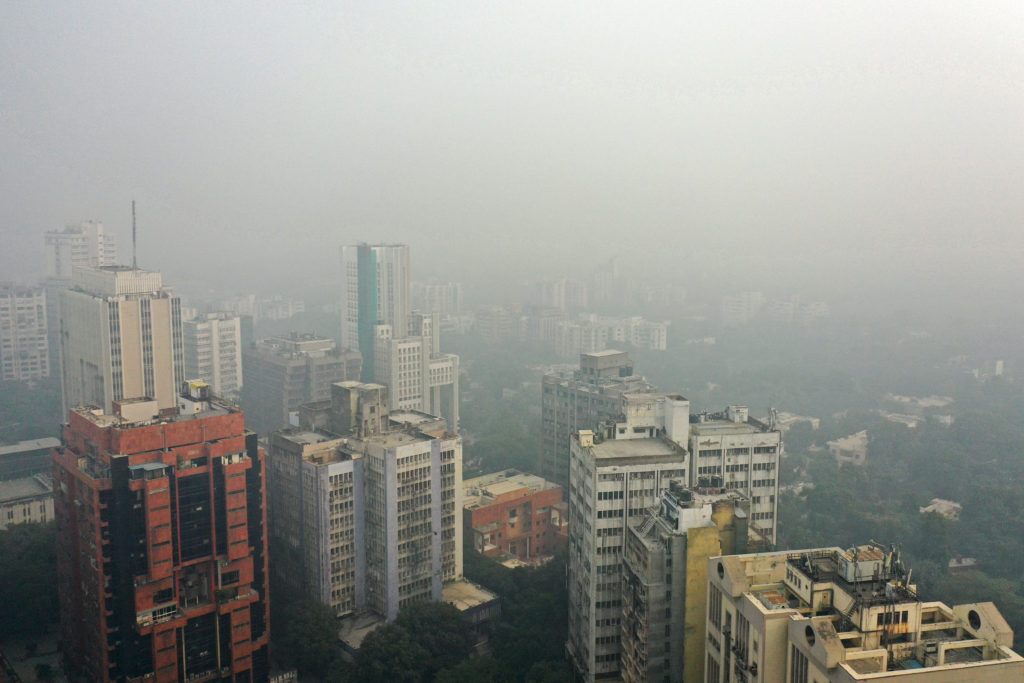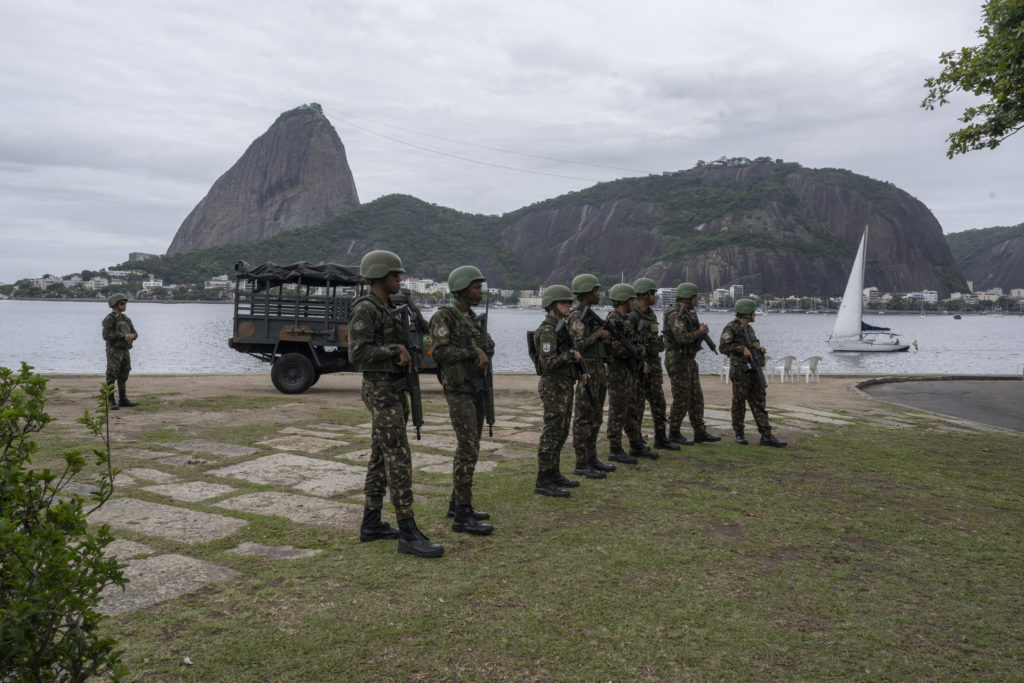Ukraine’s president showed a harrowing video of dead civilians to the UN Security Council Tuesday and called for immediate action and “accountability” for apparent Russian atrocities, as fears grow that Russia is preparing new offensives in the east and south.
With global revulsion solidifying over Moscow’s prosecution of the war, President Volodymyr Zelensky likened Russia’s assault to Nazi war crimes, while Western nations were ramping up their punishments against the Kremlin.
Washington on Wednesday will ban “all new investment” in Russia, a US source said, while Britain announced it has frozen some $350 billion in assets from President Vladimir Putin’s “war chest” so far.
But Zelensky, in an impassioned speech by video link from Kyiv to the 15-member Security Council, demanded stronger action as he delivered a chilling account of the human toll of Putin’s six-week-old war.
People “were killed in their apartments, houses… civilians were crushed by tanks while sitting in their cars in the middle of the road,” Zelensky said.
“They cut off limbs, slashed their throats, women were raped and killed in front of their children.”
“Accountability must be inevitable,” he added, calling for Russia’s exclusion from the Security Council — on which it holds veto power.
“Are you ready to close the UN” and abandon international law, the president asked. “If your answer is no, then you need to act immediately.”
Zelensky’s plea follows the harrowing discoveries of civilian victims in Bucha and other towns near Kyiv following Russian troop withdrawals, which he and other officials have denounced as war crimes and attempted “genocide”.
In an subsequent address to Spanish lawmakers, Zelensky compared Russia’s devastating assault to the Nazis’ 1937 bombing of the town of Guernica.
A grim cleanup was underway Tuesday in Bucha, where local workers were seen placing the remains of six partially burned bodies into black bags and placing them into a van.
“What we’ve seen in Bucha is not the random act of a rogue unit. It’s a deliberate campaign to kill, to torture, to rape, to commit atrocities,” US Secretary of State Antony Blinken said before leaving for a NATO meeting in Europe starting Wednesday.
NATO chief Jens Stoltenberg said the alliance expects a Russian push in “coming weeks” to try to take Ukraine’s entire eastern region of Donbas, and create a land bridge to occupied Crimea.
– ‘In front of my eyes’ –
Both Washington and the EU have vowed to squeeze Russia’s economy until Putin is forced to halt the war he launched, purportedly to defend two pro-Russia enclaves in the east.
The EU announced a fifth package of measures that would target oil and coal exports and bar Russian ships from European ports, while the US Treasury said Russia would no longer be able to pay its foreign debt with dollars held in American banks.
EU Commission chief Ursula von der Leyen, who said she would travel to Kyiv this week, has offered the bloc’s assistance in documenting proof of war crimes.
The Kremlin has denied any civilian killings, claiming that the images emerging from Bucha and other sites are fakes produced by Ukrainian forces, or that the deaths occurred after Russian soldiers pulled out.
But one Bucha resident named Olena told AFP she saw Russian soldiers shoot a man in cold blood after “brutal” troop units, older and rougher than the forces who captured the town, moved in and began spreading fear.
“Right in front of my eyes, they fired on a man who was going to get food at the supermarket,” said the 43-year-old, who did not wish to give her family name.
Despite Olena’s and other firsthand accounts, Moscow’s UN ambassador Vassily Nebenzia rejected Zelensky’s claims of Russian atrocities, telling the Security Council that the “ungrounded accusations… are not confirmed by any eye witnesses.”
Zelensky delivered a forceful rebuttal, airing a graphic, 90-second clip of what he said were images from towns including Bucha, Irpin, Dymerka, and the southern port of Mariupol.
The footage showed partially uncovered dead people, including children, in shallow graves, several bodies in a courtyard, burned corpses in the streets, and victims with hands tied behind their back slumped towards a wall.
In a continuing push to isolate Moscow, Spain, Italy, Denmark and Slovenia expelled dozens of its diplomats suspected of being intelligence operatives, after France and Germany did the same Monday, for a total of some 180 expulsions in 48 hours.
The Kremlin called it a “short-sighted move” that would complicate efforts to negotiate an end to the hostilities.
Putin meanwhile warned of “reprisals” for recent European measures targeting Russian gas giant Gazprom — and said Moscow would “monitor” its food exports to “hostile” nations, raising the spectre of further inflation pressures worldwide as the war endures.
– Mass graves –
Europe’s worst conflict in decades has killed as many as 20,000 people, according to Ukrainian estimates.
Nearly 4.25 million Ukrainians have fled the country, while an estimated 7.1 million are internally displaced, the United Nations said Tuesday.
Many in Ukraine are bracing for further Russian bombardments, and air raid sirens rang out overnight across much of the country.
Ukrainian officials say over 400 civilian bodies have been recovered from the wider Kyiv region, many of whom were buried in mass graves.
But Zelensky has warned that the deaths in Bucha could be only the tip of the iceberg, saying he had information that even more people had been killed in places like nearby Borodianka.
AFP reporters who briefly visited the Borodianka area saw no bodies in the streets, but locals reported many deaths. The scale of devastation in the town saw buildings flayed open.
“I know five civilians were killed,” said 58-year-old Rafik Azimov. “But we don’t know how many more are left in the basements of the ruined buildings after the bombardments.”
“I buried six people,” another resident, Volodymyr Nahornyi, said. “More people are under the ruins.”
– Cluster bombs used? –
Even where troops have withdrawn, fears remain, with Kyiv’s Mayor Vitali Klitschko telling residents not to return yet, citing dangers of continued shelling and unexploded munitions.
On Monday, officials in Mykolaiv, on the Black Sea not far from Odessa, said cluster bombs were used against the city in strikes that killed 10 civilians and wounded 46.
Such weapons are banned under a 2008 UN convention but it has not been signed by Russia or Ukraine.
The UN’s undersecretary-general for political and peacebuilding affairs, Rosemary DiCarlo, told the Security Council there were “credible allegations” Russia had used cluster munitions in populated areas at least 24 times.

